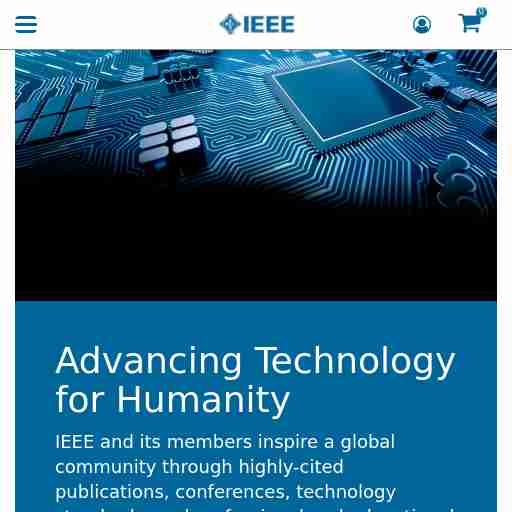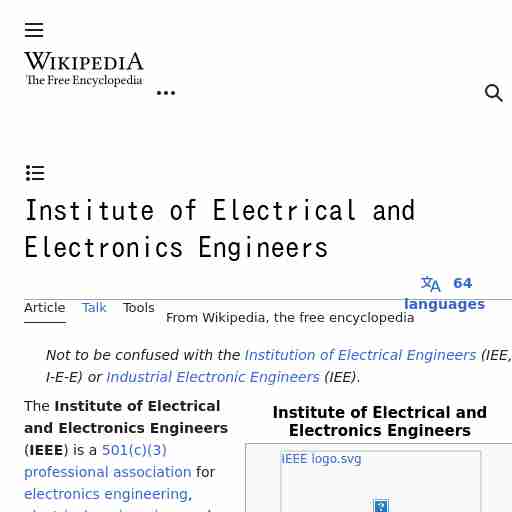If you are interested in technology and engineering, you may have come across the acronym IEEE. But what is IEEE? In this blog post, we will explore everything you need to know about IEEE, including its history, mission, products and services, and how it can benefit you.
The Institute of Electrical and Electronics Engineers (IEEE) is a professional organization dedicated to advancing technology for the benefit of humanity. It was founded in 1963 through the merger of two organizations: the American Institute of Electrical Engineers (AIEE), founded in 1884, and the Institute of Radio Engineers (IRE), founded in 1912.
Today, IEEE has over 400,000 members in more than 160 countries. Its members include engineers, scientists, researchers, educators, students, and professionals from various industries.
The mission of IEEE is to foster technological innovation and excellence for the benefit of humanity. To achieve this mission, IEEE provides its members with access to cutting-edge research and information on emerging technologies.
IEEE also develops standards for various industries to ensure interoperability and compatibility between different systems. These standards cover a wide range of areas such as telecommunications, power generation and distribution, healthcare technology, transportation systems, and more.
IEEE offers a wide range of products and services designed to help its members stay up-to-date with the latest developments in their fields. Some of these products and services include:
If you are a technology professional or student, joining IEEE can provide you with numerous benefits. Here are some of the ways IEEE can benefit you:
The Institution of Engineering and Technology (IET) is another professional organization for engineers based in the UK. While both organizations have similar missions to advance technology for the benefit of humanity, they operate independently from each other.
The cost of joining IEEE varies depending on your membership level and location. Student membership starts at $32 per year, while professional membership can range from $150 to $450 per year.
Yes, IEEE welcomes members from various industries and professions who are interested in technology and engineering.
IEEE is a professional organization dedicated to advancing technology for the benefit of humanity. It provides its members with access to cutting-edge research, educational resources, career development opportunities, and more. Whether you are a student or a seasoned professional, joining IEEE can help you stay up-to-date with the latest developments in your field and advance your career.

IEEE is the world's largest technical professional organization dedicated to advancing technology for the benefit of humanity. ... IEEE has a global presence with ... Advancing Technology for Humanity IEEE and its members inspire a global community through highly-cited publications, conferences, technology standards, and professional and educational activities. Explore what IEEE can offer you Enrich your experience with IEEE A statement from the President, Past-President, and President-Elect of IEEE: The IEEE and our members around the world support the global pursuit of peace. Become an IEEE member today; save 50% on dues Are you next? Get the resources and opportunities you need to keep on top of changes in technology, network with other professionals, and so much more. IEEE Education Week on 2–8 April 2023 is a celebration of educational opportunities from IEEE. See how IEEE impacts education at every level. Saifur Rahman, 2023 IEEE President & CEO Follow Saifur Rahman on social media to get updates from across IEEE, your professional home. 2023 IEEE Radar Conference (RadarConf23) The 2023 conference will celebrate a Fiesta of Radar Innovations involving the latest radar technologies through plenary talks, special sessions, tutorials, and the radar summer school. New Initiatives Committee (NIC) Funding is available for your innovative idea through the IEEE New Initiatives program. IEEE-USA Salary Survey now open US IEEE higher grade members: Check your email for an invitation to participate in the 2023 IEEE-USA Salary Survey. Complete it before 7 April to receive ten free uses of the salary calculator and a copy of the report. Biodiversity is critical to the ongoing health of humanity and the planet. How can AI be an essential tool in supporting biodiversity?
The requested URL was rejected. Please consult with your administrator. Your support ID is: < 8203161999071593556>
---

A not-for-profit organization, the Institute of Electrical and Electronics Engineers (IEEE) is the world's largest technical professional organization dedicated ... ABOUT THE IEEE COMPUTER SOCIETY Fuel Global Technological Advancement IEEE 802.11: Future of Wi-Fi Standards This webinar provides an overview of ongoing work on the IEEE 802.11 standard, including the P802.11be amendment and 6GHz support. “The vast community of IEEE Computer Society gives so many opportunities for networking with people from various fields. I keep coming back to create more such amazing connections.” Akshay Makkar, IEEE CS Student Member Find Your Next Computing Conference With over 189 conferences worldwide, you’ll be sure to find solutions and community in your field of interest. 2023 IEEE International Symposium on Hardware Oriented Security and Trust (HOST) 2023 IEEE 7th International Conference on Fog and Edge Computing (ICFEC) 2023 IEEE/ACM 23rd International Symposium on Cluster, Cloud and Internet Computing (CCGrid) The Computer Society is proud to have the support of leading companies to build and empower technical innovation. Conference Sponsorships & Exhibits Digital Library Institutional Subscriptions ©IEEE — All rights reserved. Use of this website signifies your agreement to the IEEE Terms and Conditions. A not-for-profit organization, the Institute of Electrical and Electronics Engineers (IEEE) is the world's largest technical professional organization dedicated to advancing technology for the benefit of humanity.

The Institute of Electrical and Electronics Engineers (IEEE) is a 501(c)(3) professional association for electronics engineering, electrical engineering, ... Institute of Electrical and Electronics Engineers From Wikipedia, the free encyclopedia Not to be confused with the Institution of Electrical Engineers (IEE, I-E-E) or Industrial Electronic Engineers (IEE). Institute of Electrical and Electronics Engineers Founded January 1, 1963; 60 years ago Legal status 501(c)(3) nonprofit organization Focus Electrical, electronics, communications, and computer engineering[2] Origins Merger of the American Institute of Electrical Engineers and the Institute of Radio Engineers Method Industry standards, conferences, publications The Institute of Electrical and Electronics Engineers (IEEE) is a 501(c)(3) professional association for electronics engineering, electrical engineering, and other related disciplines with its corporate office in New York City[4] and its operations center in Piscataway, New Jersey. The mission of the IEEE is advancing technology for the benefit of humanity.[5] The IEEE was formed from the amalgamation of the American Institute of Electrical Engineers and the Institute of Radio Engineers[6] in 1963. Due to its expansion of scope into so many related fields, it is simply referred to by the letters I-E-E-E (pronounced I-triple-E), except on legal business documents. As of 2018, it is the world's largest association of technical professionals[7] with more than 423,000 members in over 160 countries around the world.[8] Its objectives are the educational and technical advancement of electrical and electronics engineering, telecommunications, computer engineering, and other similar disciplines.[4][9]